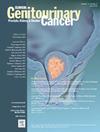The Association of Statin Use With Survival Outcomes in Patients With Metastatic Castration-Resistant Prostate Cancer (mCRPC) Treated With Androgen Receptor Targeted Therapies (ART)
IF 2.3
3区 医学
Q3 ONCOLOGY
引用次数: 0
Abstract
Background
Statins may provide a compounded effect on ART by decreasing cholesterol levels thus decreasing de novo androgen synthesis and tumor cell viability. We investigated the clinical efficacy of concurrent statin use on outcomes of patients with mCRPC taking ART.
Methods
A single-institution retrospective analysis of patients with mCRPC receiving ART from 2010 to 2021 was performed. Our primary outcome was PSA progression free survival (PFS), and our secondary outcomes were overall survival (OS). Patient characteristics were collected in addition to ART treatment course, statin treatment, and survival outcomes. Cox proportional hazards regression model was used to estimate hazard ratios (HR) for OS and PSA PFS and multivariable logistic regression to determine risk factors.
Results
153 patients with mCRPC treated with ART were included. A total of 67 patients (43.8%) received concurrent statins. Median PSA PFS was 20.4 months for patients that received statins versus 15.3 months for patients who did not receive statins. Median OS was 45.1 months for patients who received concurrent statins versus 29.7 months for patients who did not. On univariate and multivariate survival analyses, there was no statistically significant difference between groups for PSA PFS (HR 0.7; CI 0.44-1.1; P = .123) and OS (HR 0.67; CI 0.42-1.06; P = .089).
Conclusions
Our analysis suggests that statins do not significantly improve clinical outcomes in patients with mCRPC. Ultimately, current understanding remains limited, and prospective studies are needed, but here we provide a cost-effective, timely, and selective preliminary analysis.
他汀类药物的使用与接受雄激素受体靶向疗法 (ART) 治疗的转移性钙化抗性前列腺癌 (mCRPC) 患者的生存结果之间的关系。
背景:他汀类药物可降低胆固醇水平,从而减少雄激素的合成,降低肿瘤细胞的活力,从而为抗逆转录病毒疗法提供复合效应。我们研究了同时使用他汀类药物对服用抗逆转录病毒疗法的 mCRPC 患者的临床疗效:我们对 2010 年至 2021 年期间接受抗逆转录病毒疗法的 mCRPC 患者进行了单机构回顾性分析。我们的主要结果是PSA无进展生存期(PFS),次要结果是总生存期(OS)。除 ART 治疗过程、他汀类药物治疗和生存结果外,我们还收集了患者的特征。采用Cox比例危险回归模型估算OS和PSA无进展生存期的危险比(HR),并采用多变量逻辑回归确定风险因素:共纳入153例接受抗逆转录病毒疗法治疗的mCRPC患者。共有67名患者(43.8%)同时服用了他汀类药物。接受他汀类药物治疗的患者中位 PSA PFS 为 20.4 个月,而未接受他汀类药物治疗的患者为 15.3 个月。同时接受他汀类药物治疗的患者的中位 OS 为 45.1 个月,而未接受他汀类药物治疗的患者的中位 OS 为 29.7 个月。在单变量和多变量生存分析中,PSA PFS(HR 0.7;CI 0.44-1.1;P = .123)和OS(HR 0.67;CI 0.42-1.06;P = .089)组间差异无统计学意义:我们的分析表明,他汀类药物并不能显著改善mCRPC患者的临床预后。我们的分析表明,他汀类药物并不能明显改善mCRPC患者的临床预后。归根结底,目前的认识仍然有限,需要进行前瞻性研究,但我们在此提供了一项具有成本效益、及时且有选择性的初步分析。
本文章由计算机程序翻译,如有差异,请以英文原文为准。
求助全文
约1分钟内获得全文
求助全文
来源期刊

Clinical genitourinary cancer
医学-泌尿学与肾脏学
CiteScore
5.20
自引率
6.20%
发文量
201
审稿时长
54 days
期刊介绍:
Clinical Genitourinary Cancer is a peer-reviewed journal that publishes original articles describing various aspects of clinical and translational research in genitourinary cancers. Clinical Genitourinary Cancer is devoted to articles on detection, diagnosis, prevention, and treatment of genitourinary cancers. The main emphasis is on recent scientific developments in all areas related to genitourinary malignancies. Specific areas of interest include clinical research and mechanistic approaches; drug sensitivity and resistance; gene and antisense therapy; pathology, markers, and prognostic indicators; chemoprevention strategies; multimodality therapy; and integration of various approaches.
 求助内容:
求助内容: 应助结果提醒方式:
应助结果提醒方式:


